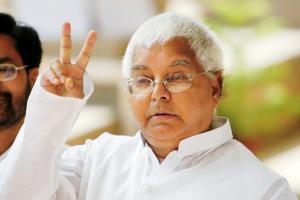Bihar baahubali's recently released memoir reveals an indefatigable man whose politics is inherently personal. Isn't that true for all?

Lalu Prasad Yadav even cracked his college interview because of first-rate mimicry of a character called Loha Singh, from a popular Bhojpuri radio-series. Pic/AFP
 During the mid-70s, at the peak of the 'Total Revolution' movement led by Jayaprakash Narayan (JP), aimed at toppling the tyrannical Indira Gandhi's regime--she'd imposed a 21-month Emergency (in 1975)--young Lalu Prasad Yadav's stars were swiftly on the rise.
During the mid-70s, at the peak of the 'Total Revolution' movement led by Jayaprakash Narayan (JP), aimed at toppling the tyrannical Indira Gandhi's regime--she'd imposed a 21-month Emergency (in 1975)--young Lalu Prasad Yadav's stars were swiftly on the rise.
ADVERTISEMENT
Bihar was Ground Zero for the non-violent movement to rescue the Constitution. The young, especially college students, driven by impassioned idealism, were leading the charge. Yadav was just the right person, at the right place, elected at the time as president of Patna University's students' union.
Guess who were Yadav's deputies? Sushil Kumar Modi (who heads BJP in Bihar) and Ravi Shankar Prasad (union minister in the current NDA government). Both of them, feeling insecure about Yadav's proximity to JP, ratted on the poor boy to the master.
Little boy Lalu had consumed liquor, and collected money, which were unaccounted for, they told JP, who summoned his protégé. Yadav admitted that he did drink toddy, but deflected attention on himself, ratting on a senior, Shivanand Tiwari (now with Nitish Kumar's JDU) instead--telling JP that he smoked ganja!
It's been over 40 years, and Yadav clearly doesn't get along with Modi, Prasad still. If this anecdote from Yadav's recently released political memoir, Gopalganj To Raisina (co-authored by journalist Nalin Verma) sounds school-boyish, that's because, so is Indian politics (or politics in general), with petty egos driving personal ambitions at its core and public policy only an incidental by-product of it all.
Yadav gained national prominence at the end of the '80s. With help from Chaudhary Devi Lal, fellow champion of the rural-oppressed from Haryana, he began to politick in New Delhi. As Bihar chief minister, he met the then Prime Minister VP Singh for the first time at his office, apprising him of his deputy PM Lal's parallel ambitions. Singh assumed Yadav belonged to the 'Devi Lal camp'. Yadav told him to get rid of the old man instead. This would be hard to pull off, since Lal was a Dalit hero.
To counter a possible perception crisis from the imminent move, Yadav handed Singh a copy of the Mandal Commission Report (on deeper caste-based reservations in government jobs) --gathering dust since 1983-- and asked him to instantly implement it. Singh did it right away, and that explains the turning point in contemporary Indian politics.
This isn't to suggest ideologies don't play an important role. They certainly have in Yadav's case. Besides JP, he considers Ram Manohar Lohia, from Uttar Pradesh, educated in Germany, strongly stationed in Bihar, as his political mentor.
In the mid-50s, Lohia founded Samyukta Socialist Party (SamSoPa), coining the slogan, "SamSoPa ne baandhi gaanth, pichhara pave sau mein saath"--SSP is determined to get 60 per cent representation for backward castes--in line with their population ratio--in all spheres of life. Besides, as a caste-led leader with strong Muslim support, Yadav possesses a relatively inclusive, liberal streak, and was a rare leader to successfully take on religion-based politics in his state, with the ascent of 'Mandir', to counter 'Mandal', in the early '90s. This culminated with Yadav defeating the BJP-RSS/Narendra Modi-Amit Shah juggernaut at the 2015 state elections. Four years later, as you travel in Bihar, people still recall Yadav's mimicry of Modi with glee, "Modiji dheere boliye, gala ka nas phat jayega!"
This talent for humour and theatrical entertainment, put to incredible use in the '90s, when satellite television had just exploded, is what gave Yadav a national edge. He's self-admittedly an actor, who even cracked his college interview, because of first-rate mimicry of a character called Loha Singh, from a popular Bhojpuri radio-series.
The relatively sober current CM Nitish Kumar, also from Patna University, had been Yadav's fellow-traveller over the years, up until Yadav's second term as CM. This is when, Yadav admits, success got to his head. As chief executive, he wasn't as prone to consensus/consultations, upsetting colleagues along the way.
Not one to take adversaries lightly, the Modi-Shah government has ensured Yadav, 70, languishes in jail over corruption charges. His health is failing. Yet, his autobiography, spanning 40-plus years of public life, is chiefly about contemporary politicians, ongoing 2019 elections, Mahagathbandhan (grand alliance), rather than much nostalgia/melancholy. He sounds indefatigable still.
As CM, Kumar is presently aligned with BJP. He dumped Yadav after their combined win in 2015, and tried to return to the coalition before the 2019 elections, but Yadav wouldn't take his calls. One of the things he heavily criticises Kumar for is introducing the draconian alcohol prohibition law in Bihar, wherein by May 2018, 1.41 lakh people had been arrested for drinking, even holding en empty liquor bottle.
Yadav was part of the government when the booze ban was imposed. He had Kumar relax the rule for toddy -- taxes on which he abolished, as soon as he first came to power in 1990. Yup, politics is inherently personal. Isn't it?
Mayank Shekhar attempts to make sense of mass culture. He tweets @mayankw14 Send your feedback to [email protected]
Catch up on all the latest Mumbai news, crime news, current affairs, and also a complete guide on Mumbai from food to things to do and events across the city here. Also download the new mid-day Android and iOS apps to get latest updates
 Subscribe today by clicking the link and stay updated with the latest news!" Click here!
Subscribe today by clicking the link and stay updated with the latest news!" Click here!






